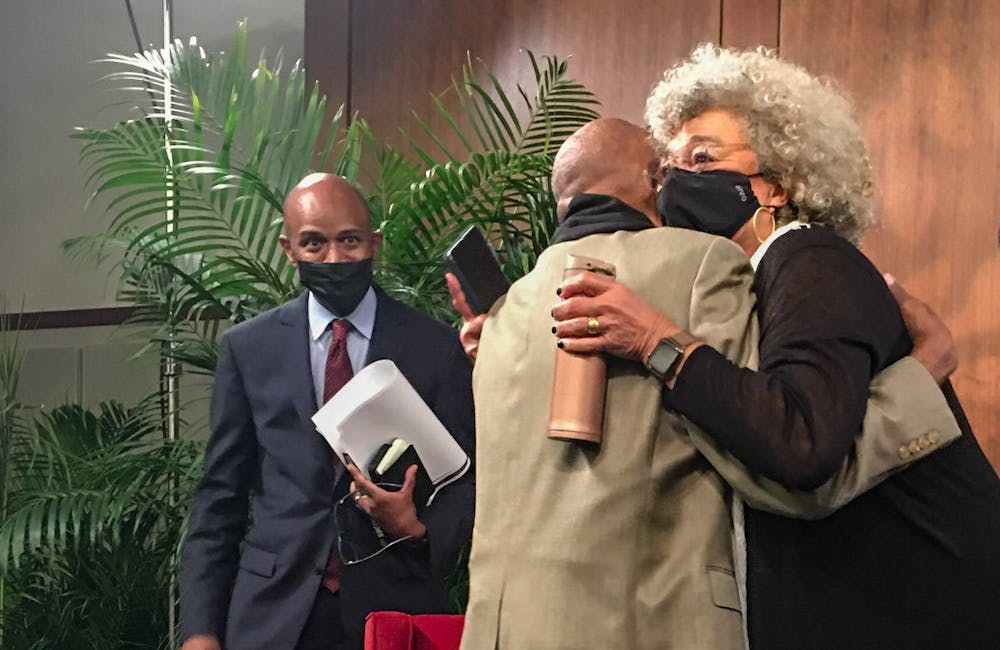Activist and author Angela Davis sat down with USC professor Nikky Finney to mark the 50th year of USC’s African American studies program at the annual Robert Smalls Lecture on April 21.
The Robert Smalls Annual Lecture was started in 1997 by Andrew Billingsley, distinguished former professor of Sociology and African American Studies at USC.
Davis, a civil rights activist, communist and member of the Black Panther Party, garnered the public's attention in 1970 for her arrest and then acquittal of aggravated kidnapping and first-degree murder charges. She is now the author of 10 books and a professor at the University of California, Santa Cruz.
Finney, the John H. Bennett Jr. Endowed Professor of Creative Writing and Southern Letters and Carolina Distinguished Professor in USC’s Department of English Language and Literature at the College of Arts and Sciences, interviewed Davis.
The event was publicized as “The Irresistible Conversation,” and Davis and Finney were greeted by an audience of about 800 people at the USC Alumni Center and introduced by the benefactor of USC’s business school, Darla Moore.
“Personally, I can recall as a young girl being told that Angela Davis was someone I needed to be scared of. So you might imagine how surprised I was to later discover how much Professor Davis and I potentially have in common and how aligned I believe some of our ideas concerning the future of America are,” Moore said.
Moore said it's important to have difficult conversations about racism in South Carolina.
"This is exactly where the real work could and should happen," Moore said.
During the conversation itself, Finney asked Davis questions about climate justice, Black motherhood, feminism, incarceration and intersectionality — all topics Davis has published literature on.
“It took me a long time to recognize that I am walking on the path that my mother carved out for me,” Davis said.
Davis said her mother fought for her while she was in jail, often while holding a baby niece in one arm and a picket sign in the other.
“We don’t acknowledge the role that Black women have played and the long struggle for Black liberation in the centuries-old struggles for Black liberation,” Davis said.
Finney and Davis discussed at length the fate of Richard Bernard Moore, a Black South Carolinian man who may become the first person executed by firing squad in the United States since 2010. Davis is staunchly anti capital punishment and Richard Moore was issued a temporary stay by the South Carolina State Supreme Court on April 20, pending the conclusion of another case challenging the constitutionality of the firing squad as an execution method.
“The desperation that one sees in some conservative circles … is at the same time a fear of the future, and a desire, therefore, to return to what is known. What is known is racism, as white supremacy. It's the firing squad,” Davis said.
Finney referred to Davis as a proponent of prison reform in passing, prompting Davis to pause the conversation to correct her.
“I don't consider myself as a person who supports prison reform. I consider myself an abolitionist,” Davis said.
Finney also asked Davis about her thoughts on teaching about race in schools and the wave of anti-critical race theory bills being introduced in state government.
“They are afraid that young, white children are going to rebel … I think that the railing against critical race theory by the conservatives is an attempt to prevent a movement from growing and developing based on what we witnessed in the summer of 2020,” Davis said.
The first of the annual lectures was about Robert Smalls, a self emancipated slave who commandeered a Confederate ship and steered it into Union-controlled waters — he later went on to serve in the South Carolina State Legislature.
Billingsley, now 96, was in attendance at this year’s lecture. He has only missed one lecture since the yearly lecture began. Coincidentally, Davis’ father taught him math in high school in Birmingham, Alabama before Davis was born.
“I first met (Davis) in California where she became famous. I was teaching at Berkeley and she came to speak at Berkeley," Billingsley said. "She has really made a name for herself.”

